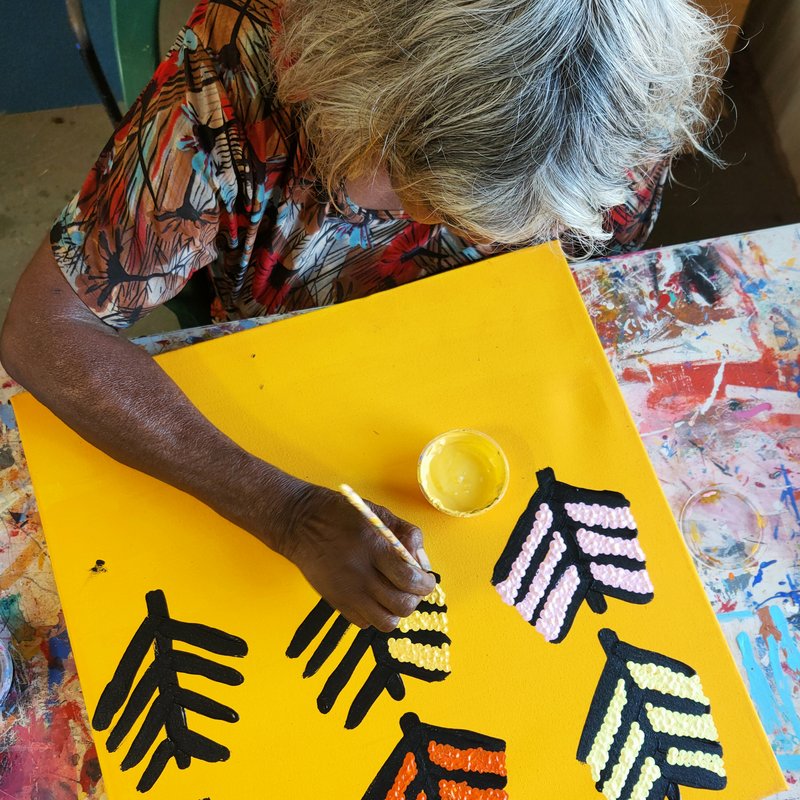Proposed changes to copyright laws pose threat to artists’ rights
NAVA concerned draft legislation may lead to increased instances of copyright infringement.
NAVA concerned draft legislation may lead to increased instances of copyright infringement.

Image: Ena Fly Lane working in the studio. Photo by Dr Chrischona Schmidt courtesy Ikuntji Artists, NT.
[Image description: Close up aerial photo of an artist working on a bright yellow canvas. She is painting honey grevillea – Kalinkalinpa.]
The Australian government is currently requesting feedback on an exposure draft of the Copyright Amendment (Access Reforms) Bill 2021. The proposed changes to the nation’s copyright laws aim to better support the needs of Australians copyright users to access content in an increasingly digital environment. While NAVA supports the need for changes to the outdated Copyright Act 1968, NAVA fears the reforms will weaken laws that protect artists’ rights.
More than fifty years have passed since the Copyright Act was implemented. During this time, digital and social media have changed public, commercial and government expectations on what kinds of creative work should be accessed for free or manipulated into unauthorised uses. These changing expectations are not a justification for weakening laws that protect artists’ rights; rather, they signal the need to strengthen those laws. At the same time, the public, the corporate sector and all levels of government must be better educated about artists’ ownership rights of their own work and that ‘free’ is not ‘fair’.
The copyright system in Australia has been subject to a number of government inquiries, consultations and reports in recent years spurred on by current legislation falling behind technological advancement and debates around ‘fair use’ vs. ‘fair dealing’. The copyright law of Australia is governed by Copyright Act 1968 (Cth), operating nationwide. This Act and subsequent amendments gives practitioners control over the reproduction of their work. This includes all artistic creators, not just those who may consider themselves ‘professional.’
NAVA has been working collaboratively with other concerned arts organisations to understand what the proposed changes will mean for artists and their rights as copyright owners.
Currently it allows for certain limited exceptions under the general heading ’fair dealing’. The main exceptions to copyright infringement are the use for the purposes of:
It must also be 'fair'. What is fair will depend on all the circumstances, including the nature of the work, the nature of the use and the effect of the use on any commercial market for the work. The newly proposed reforms do not suggest that the Australian system move away from a ‘fair dealing’ regime, but it does recommend that the exceptions to copyright infringement be extended to include other purposes and the definition of what is considered ‘fair’ be broadened.
NAVA is concerned that a weakening of laws around copyright usage will create a power imbalance as the onus would be on the artist to prove in court that a use is not ‘fair’. While legal avenues may be available, the time and financial cost to artists is often prohibitive.
The Copyright Amendment (Access Reforms) Bill 2021 focuses on five main reform measures:
You can read more about the details of all these proposed changes in the exposure draft discussion paper and NAVA will be breaking down our concerns on all measures in a submission that will be publicly available from 25 February 2022.
NAVA will be asking the Government not to go ahead with the Bill in its current form, pointing to the following issues affecting artists:
There is inherent hypocrisy in these reforms as they consistently reinforce the value of copyrighted material, of artwork, yet the changes intentionally create scenarios in which artists are less likely to be remunerated for their work and are more likely to suffer from exploitation.
The due date for having your say has been extended to 25 February 2022, NAVA encourages anyone with examples of how they will be directly affected by these changes to lodge a submission, for help drafting your response please refer to our guide on ‘How to write a submission to an inquiry’.